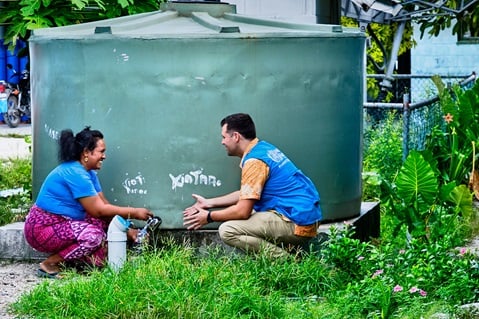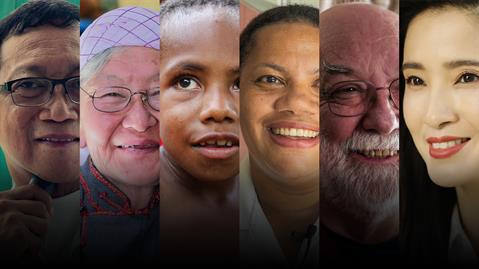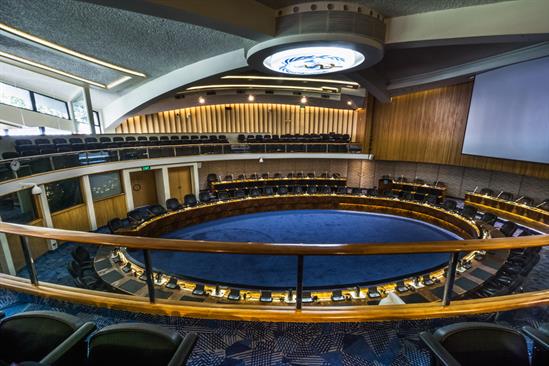Singapore, 18 September 2025 – Globally, 5% of total climate emissions come from the healthcare sector, contributing to the ever-mounting global threat of climate change. To address this specific challenge, the World Health Organization Western Pacific Regional Office and the Centre for Sustainable Medicine at the National University of Singapore convened representatives from more than 20 Asia-Pacific countries* to chart a roadmap to transform the region’s healthcare systems to adapt to the changing climate, lower their carbon emissions, and become more environmentally sustainable.
The Inaugural Western Pacific Action Forum on Climate-Resilient and Sustainable Health Systems spotlighted the urgent need to invest in climate-resilient and low-carbon health systems – a win-win strategy that helps protect lives, strengthens national preparedness against multiple hazards, and reduces costs through sustainable and efficient measures.
Climate-resilient health systems reduce vulnerability to extreme weather events, natural hazards, disease outbreaks and compound crises. Most health system carbon emissions stem from supply chain activities. Measuring baseline emissions can generate efficiency and savings that may be reinvested to protect health. Integrated approaches not only improve health outcomes but also support national climate and development goals.
The WHO Western Pacific Regional Office, through its Asia-Pacific Centre for Environment and Health, is working with Member States to strengthen and expand the global Alliance for Transformative Action on Climate and Health (ATACH). Malaysia recently became the eleventh country in the Region to join ATACH, swiftly followed by the Cook Islands as the twelfth, reinforcing regional momentum.
Dr Saia Ma’u Piukala, WHO Regional Director for the Western Pacific, opened the Forum with a strong call to action, stating, “The climate crisis is projected to cause an additional 250 000 deaths every year between 2030 and 2050. Investing in climate-resilient and low-carbon health systems is therefore one of the smartest, and possibly one of the least complex, choices we can make. It saves lives today while preparing our communities, and the health systems that safeguard them, for the future.”
Mr Tan Kiat How, Senior Minister of State, Ministry of Communications and Information, and Ministry of National Development, Singapore, reaffirmed his country’s commitment to climate action in the health sector. “Singapore is taking steps to lower our healthcare sector emissions … The actions we take will not only safeguard the health of our people but also strengthen the resilience and sustainability of our healthcare system in the face of mounting climate change challenges. By working closely together, we can transform the way healthcare is delivered, creating a healthier future for both people and planet.”
Stressing the importance of collaboration across sectors, Dr Susan Mercado, Director for Programme Management, WHO Western Pacific, emphasized, “The Forum provided us with an opportunity for countries to share experiences and learn from one another. Almost 99% of the world’s population breathes air with pollution levels exceeding WHO air quality limits, reminding us that no country is immune. Regional collaboration, recognizing that all countries are ultimately connected, is key to accelerating climate and health action.”
The Forum aimed to foster policy and budgetary commitments to embed climate resilience and low-carbon strategies into national health system planning and implementation. Over two days in Singapore, participants engaged in technical sessions, policy dialogue and knowledge exchange designed to inspire solutions, strengthen partnerships and accelerate implementation.
Professor Nick Watts, the Director of the Centre for Sustainable Medicine at the National University of Singapore, spoke about the broader vision, stressing, “This is not only about protecting people’s health but also about contributing to climate and development goals, especially with the finish line of the Sustainable Development Goals barely five years away. A healthier, more resilient future is still possible if we act together.”
*Countries participating in the Forum are (in alphabetical order):
Australia, Brunei Darussalam, Cambodia, China, Cook Islands, Fiji, Indonesia, Japan, Kiribati, Lao People’s Democratic Republic, Malaysia, Marshall Islands, Micronesia (Federated States of), Mongolia, New Zealand, Palau, Papua New Guinea, Philippines, Singapore, Solomon Islands, Tonga, Tuvalu, Vanuatu and Viet Nam.
About WHO ACE
The WHO Asia-Pacific Centre for Environment and Health (ACE), based in Seoul, Republic of Korea, supports 38 WHO Member States and areas in addressing the health impacts of climate change and environmental risks, and in building resilient, sustainable health systems.
About ATACH
Established at COP26 in 2022, the Alliance for Transformative Action on Climate and Health (ATACH) brings together over 90 WHO Member States and more than 80 partners. The Alliance supports countries in building climate-resilient, sustainable, and low-carbon health systems, advancing climate–health priorities and advocating for health-promoting climate action across all sectors.
For media interviews or further information, please contact:
Dongwhan Shin, WHO Asia-Pacific Centre for Environment and Health
Tel: +82 2 739 8730, dong.shin@who.intJit Sohal, National University of Singapore Centre for Sustainable Medicine
Tel: +63 949 994 0375, jsohal@nus.edu.sg




